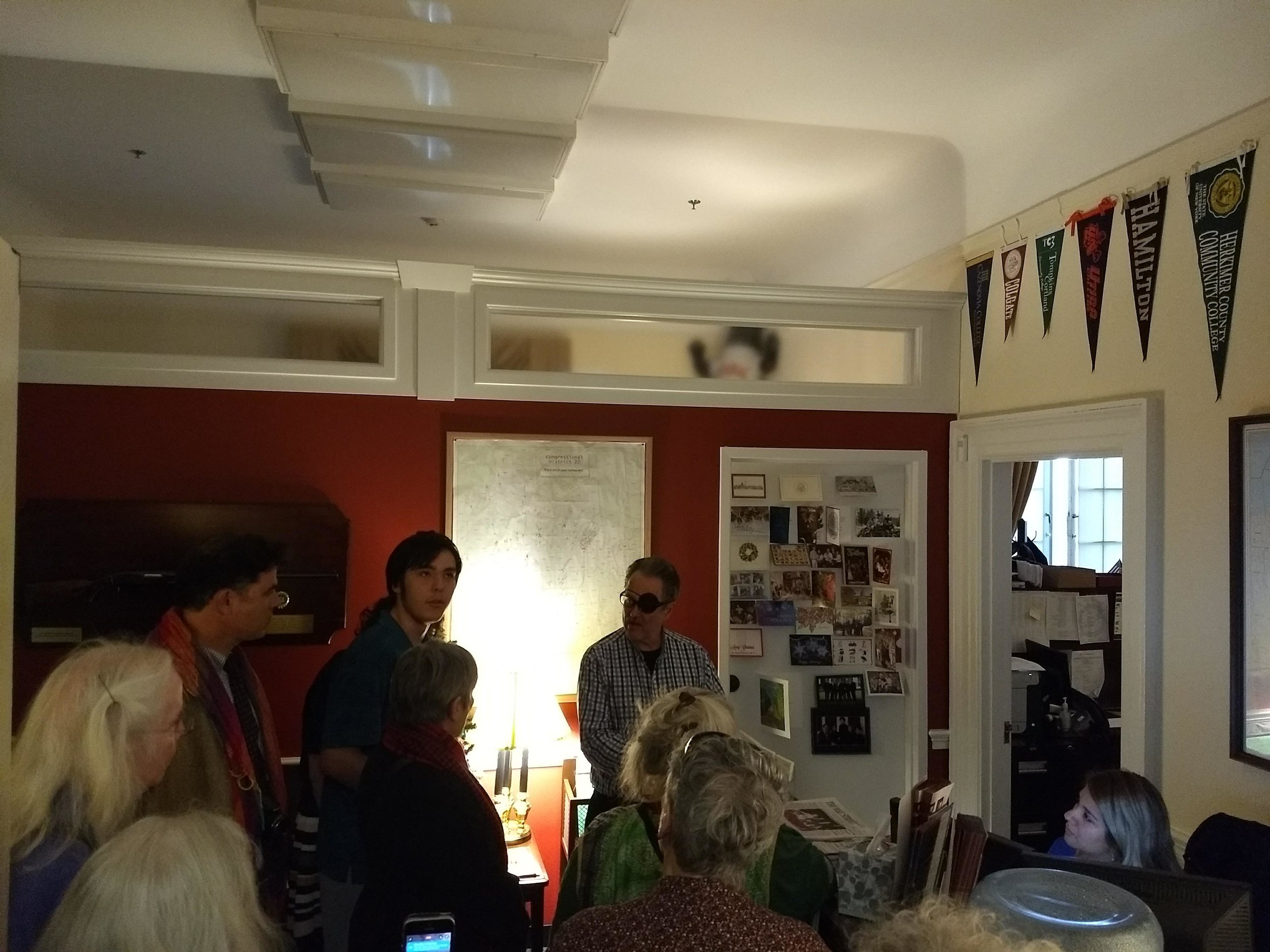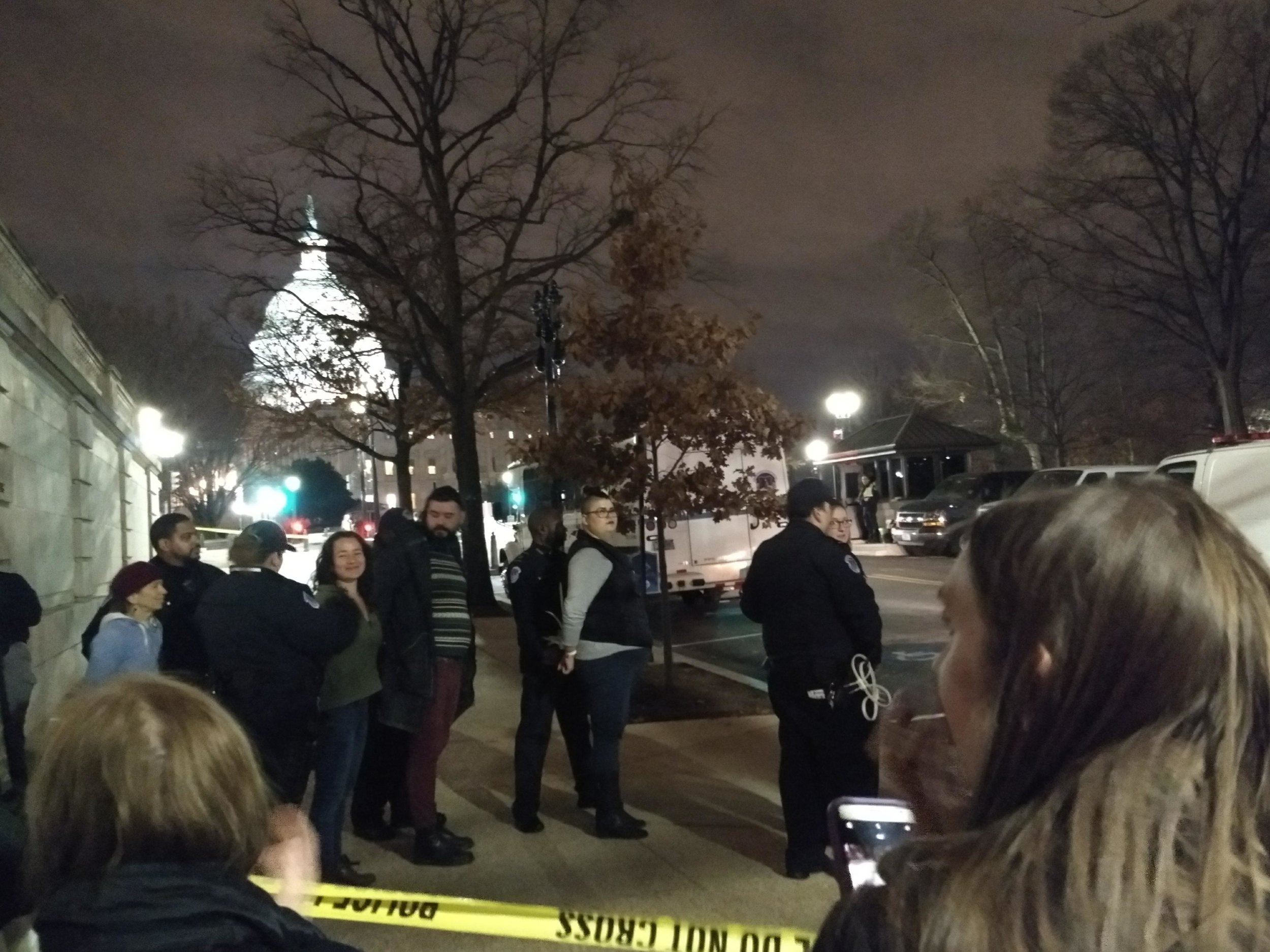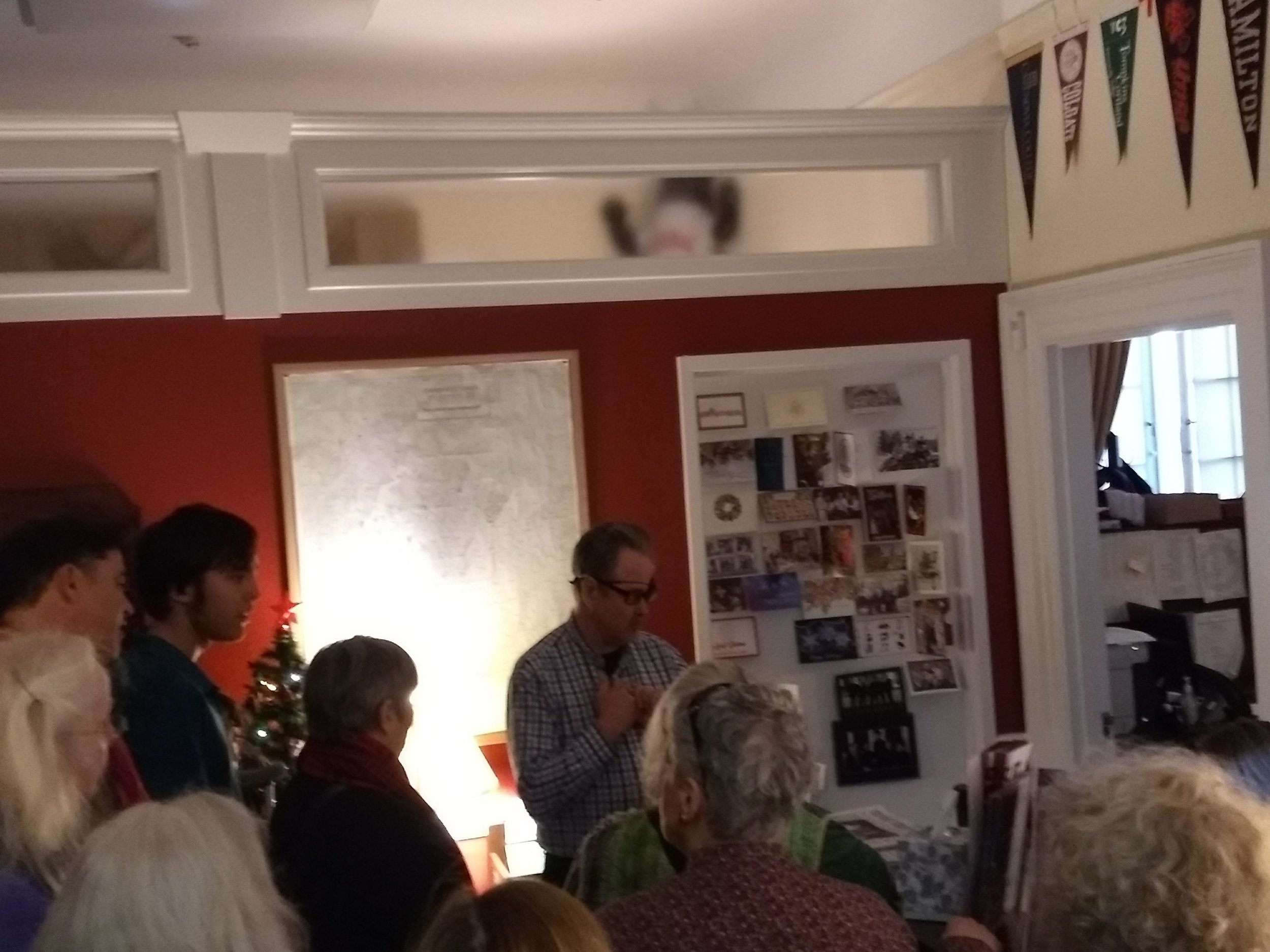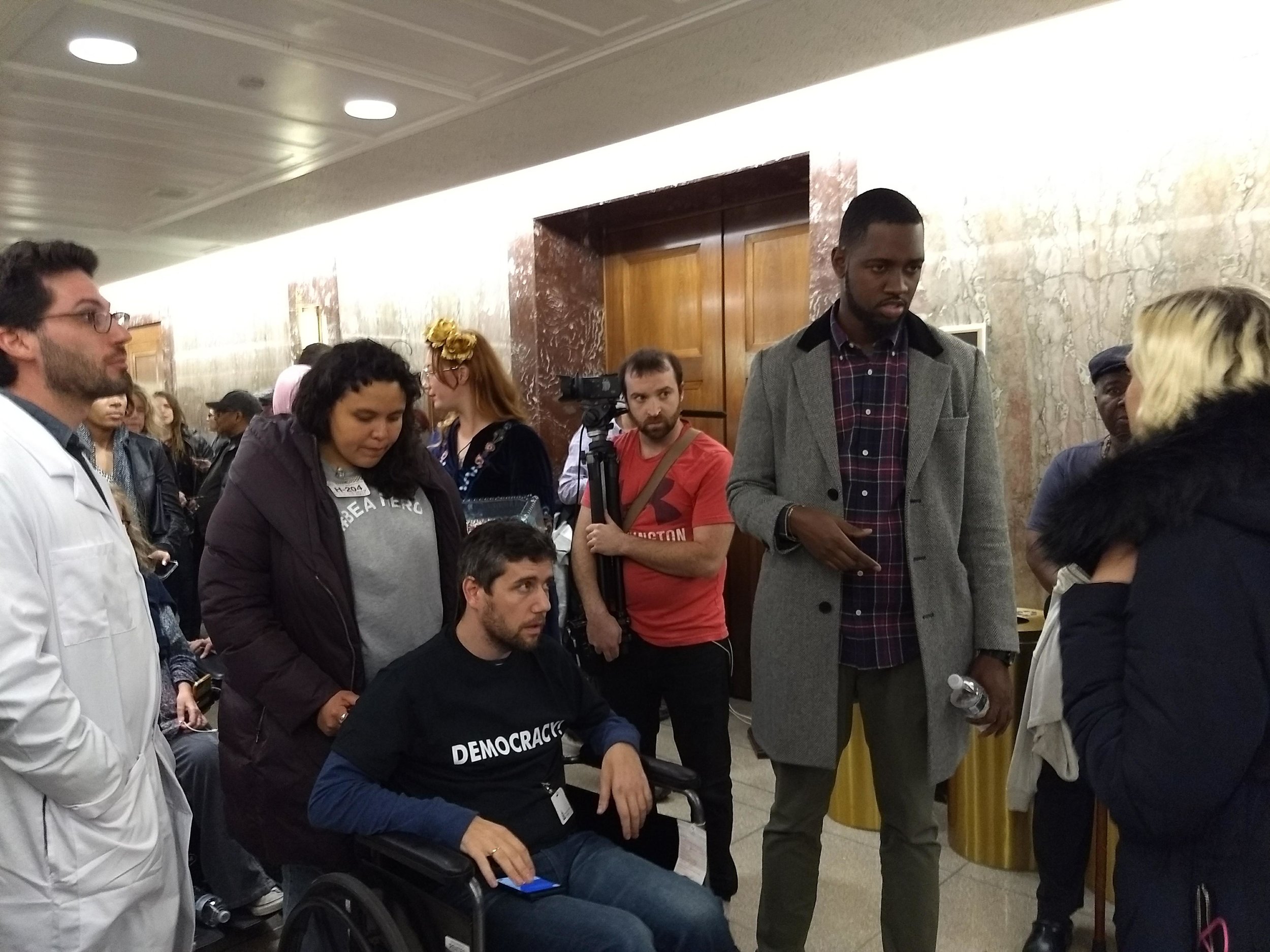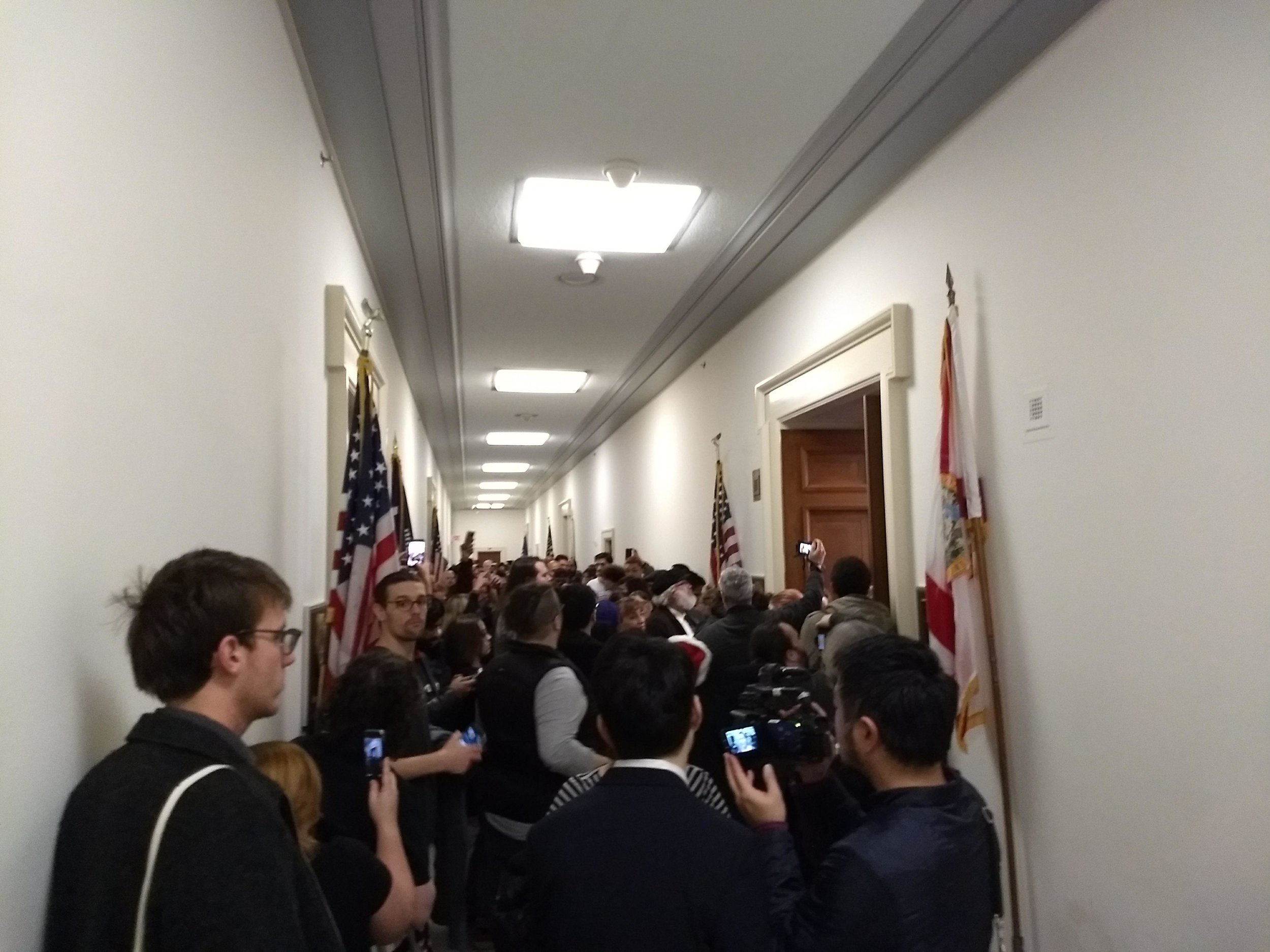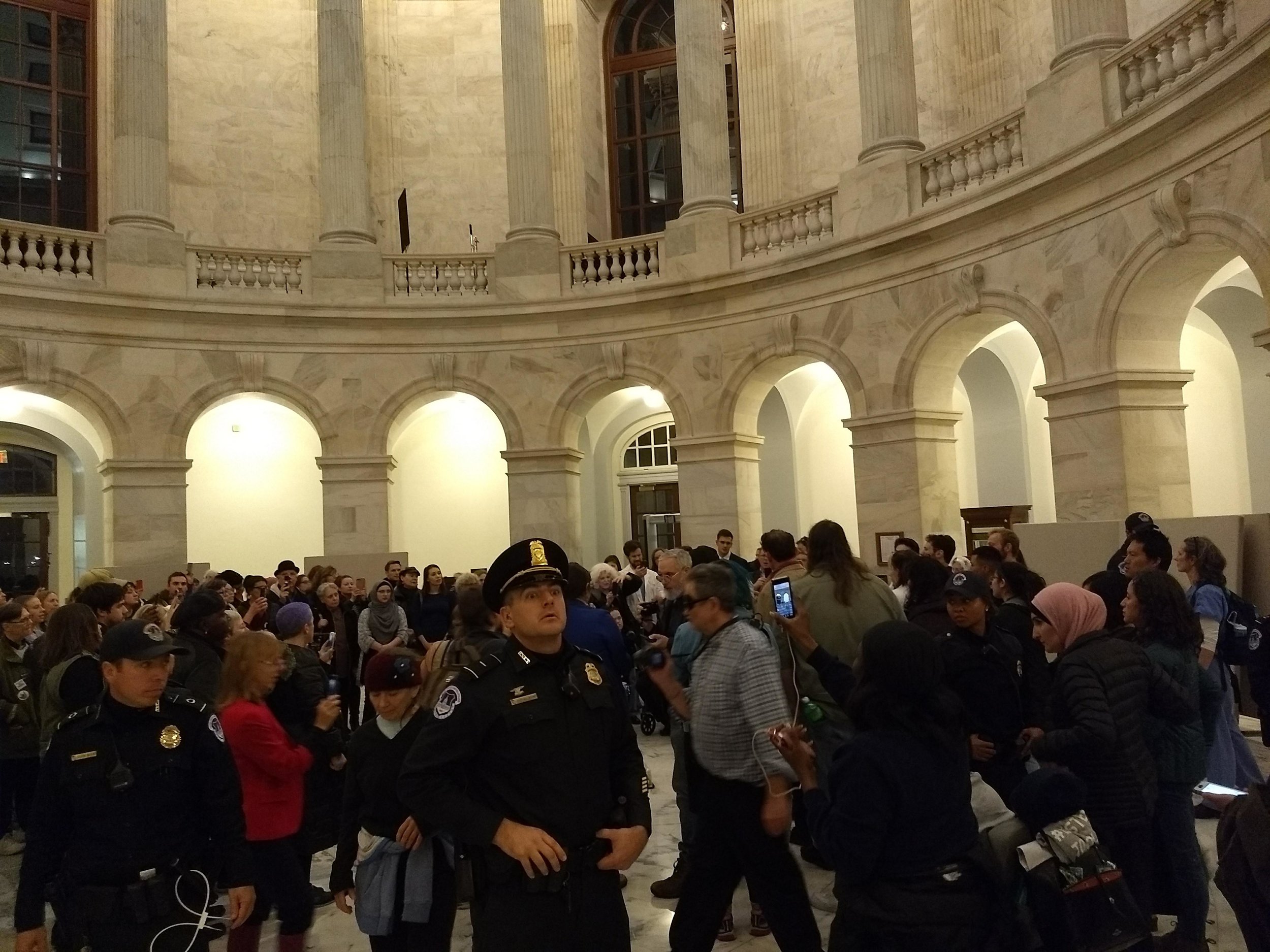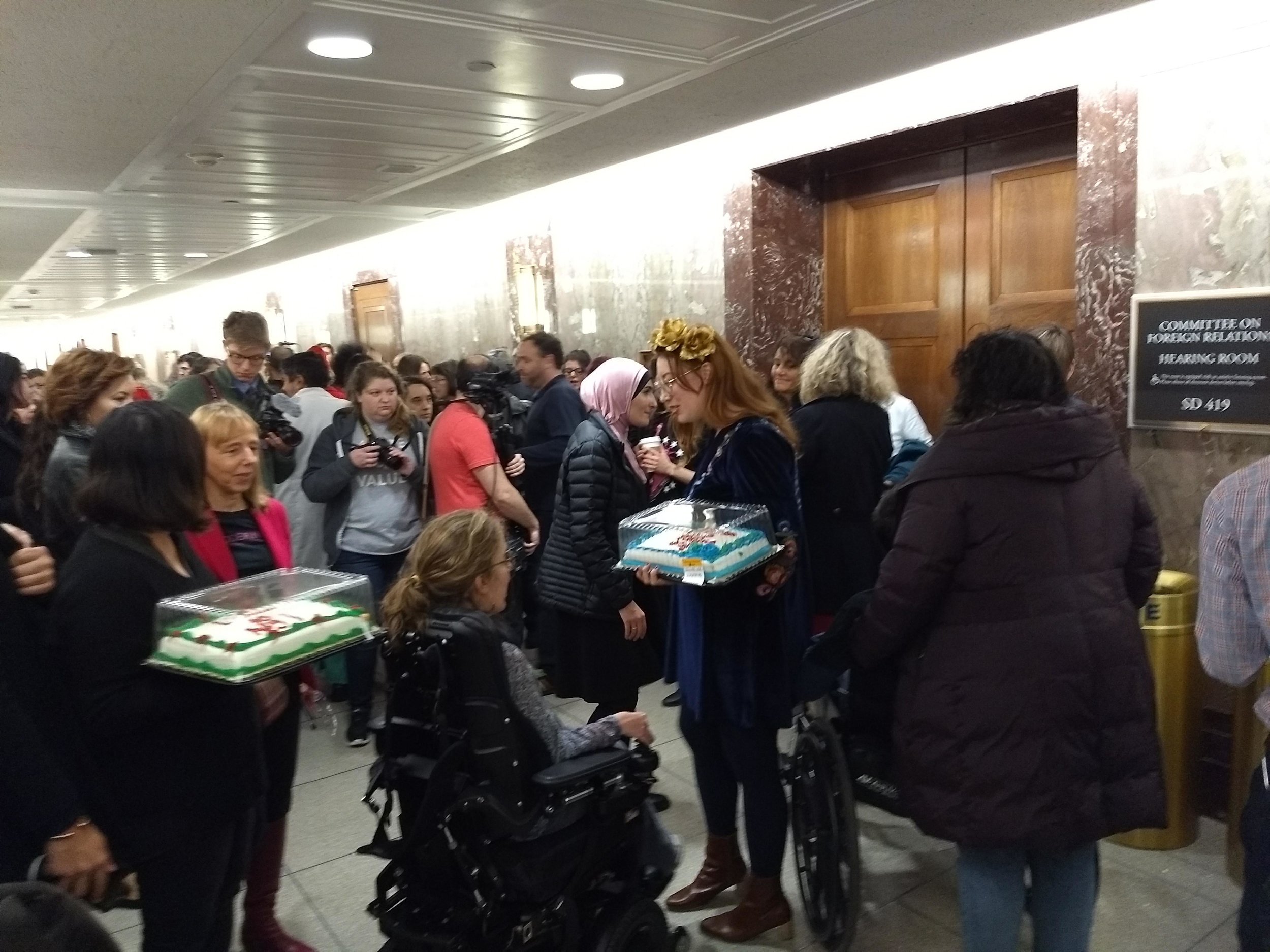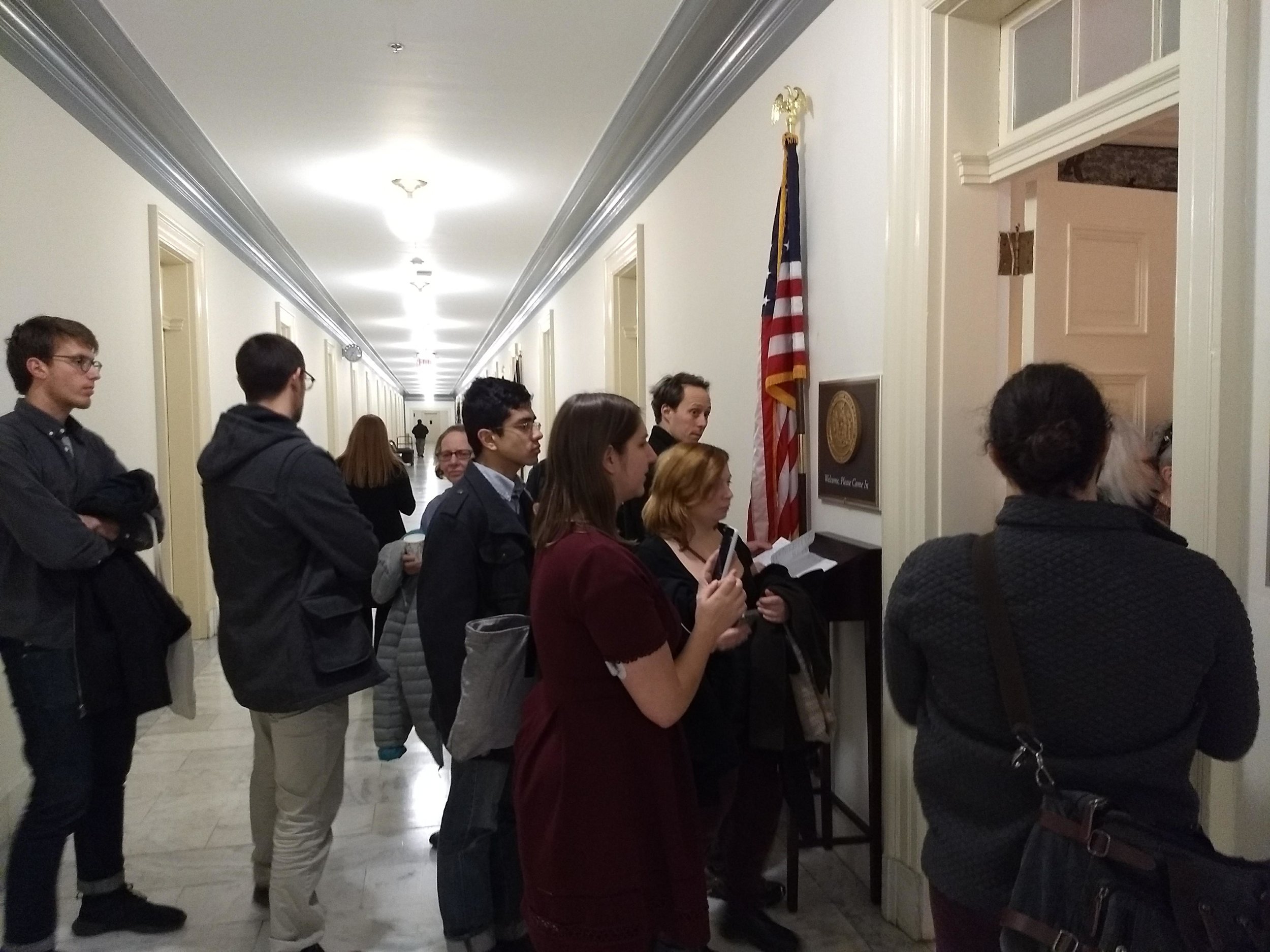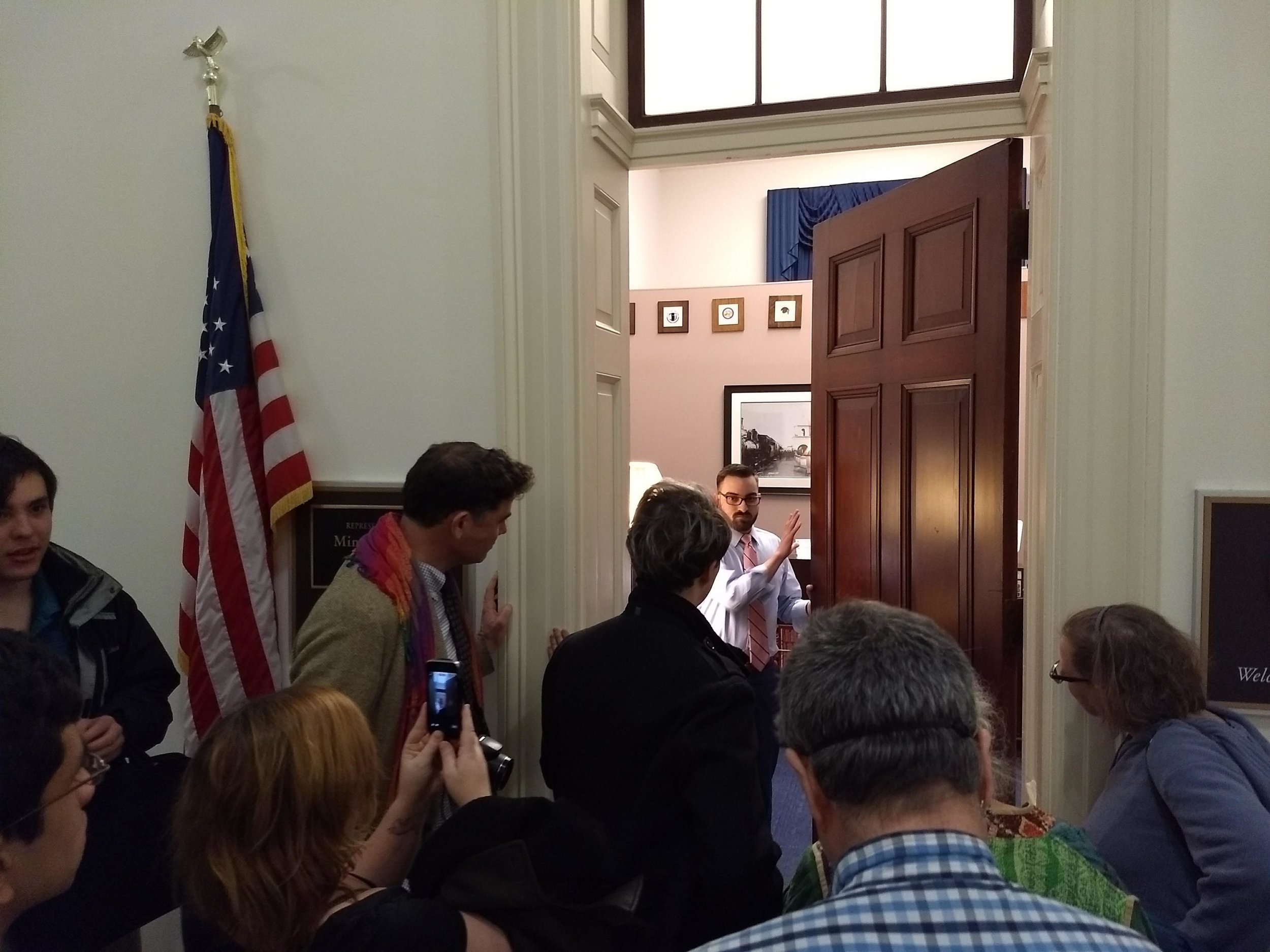The Unkindest Cuts: How Everyday People Fight a Dangerous Tax Bill
NOTE: After I saw on social media that Brooke was active with advocacy efforts on the recent tax bill debate, I invited her to share what she was doing and why she was doing it. Brooke recently became the Peace Ministry Coordinator at Church of the Advent Hope, which is a member of the APF Peace Church Network. Thank you, Brooke, for getting involved and for sharing your thoughts, experiences, and pictures with us. --Jeff Boyd
The Unkindest Cuts: How Everyday People Fight a Dangerous Tax Bill
By Brooke Pierce
It was a week before Christmas, and the meeting room at the Capitol Skyline Hotel in Washington, D.C. was getting packed. There were senior citizens, teenagers, disabled people, clergy, nurses in scrubs, people of just about every race and creed and color arriving from all around the country. It looked like a cross-section of America; just a bunch of regular folks. But today these individuals had gathered to be activists. They were here to fight a tax bill. Some were involved in this fight for the first time. Others I recognized from sit-ins that took place the week before, and the week before that. Many were prepared to get arrested that day in a yet-to-be-determined act of civil disobedience.
Credit: Brooke Pierce
My last arrest for civil disobedience was during the fight to stop the repeal of the Affordable Care Act back in July. I was arrested alongside rabbis and ministers and doctors as we stood in the Senate gallery and implored our representatives down on the floor to “Kill the bill!” The advocacy of faith leaders like the Reverend William Barber of the Moral Mondays movement was part of what inspired me to get more involved in the healthcare fight, along with my own self-interest (I get my health insurance through the ACA). And it was my involvement in the Peace Ministry at my church that had initially spurred me to investigate these kinds of social justice actions, in the hope of finding ways to turn our meaningful Sabbath afternoon discussions into something more tangible.
The ACA repeal effort had been dealt a fatal blow by John McCain’s downturned thumb two days after our Senate gallery protest, but it wouldn’t be long until the attack on healthcare resurfaced in a different form—which is what brought me to the campaign against the “tax reform” bill. A tax bill might not sound like the type of legislation that would excite ordinary folks into action, but many of the people in that room at the Capitol Skyline were intensely worried about how it would affect them and the people they cared about. During the hurried process of writing the bill—which included input from a lot of lobbyists, but no actual hearings—a repeal of the ACA mandate was thrown in. Estimated to result in 13 million people going off health insurance, this provision effectively turned the tax cut bill into a healthcare bill. The nurses in that room certainly knew what it could mean for their patients.
Independent scoring showed the tax bill would put at least a $1 trillion dollar hole in the deficit. The bill’s proponents were pretending not to care about the deficit at the moment, but the cat was already out of the bag that they intended to eventually use it as an excuse to make future cuts to Medicare, Medicaid, and Social Security. Obviously this had many of the sick and elderly in the room deeply concerned—as well as those of us who know that any day we could become sick, and that one day we will be elderly.
Unfortunately, much of the news media made the tax bill appear as dull as possible, and minimized the efforts of the Americans strenuously opposing it. Capitol Hill correspondents would report that ‘There are a few activists here, but not as many as we saw fighting the healthcare bill.’ Apparently it doesn’t occur to the people who are paid to work on Capitol Hill that the rest of us have to navigate jobs, family, community responsibilities, and more to transport ourselves to Washington, D.C. It would be nice if they’d report on how absurd it is that citizens have to continually drag themselves to the Washington just to tell their “representatives” how to actually represent them.
That was, in fact, the primary mission of those gathering at the Capitol Skyline on December 18: Visit the Republican members of Congress who might be wavering, and ask them to vote no. We broke into groups of 15 or so and headed for the Congressional office buildings. One of my group’s early stops was at the office of a New York representative. Several of our number entered and asked to speak with the rep (not available, of course), then settled for explaining their case to staffers. The criticisms of the bill ranged from frustration over the elimination of the state and local tax deduction to general dismay that deep corporate tax cuts are supposedly needed “to stimulate the economy” at a time when profits are at a record high and so is the stock market. Many of those who spoke seemed to understand the bill (and its potential consequences) better than the staff.
This process of confronting representatives to hold them accountable is a big part of what political activism is about. A week or two earlier, there was a moment that went viral when Ady Barkan, who has ALS and has been a fierce opponent of the tax bill, talked to Senator Jeff Flake on a plane. He told the senator that the bill was a threat to his health because it could trigger cuts to disability spending that would compromise his access to necessary medical treatment. Flake marveled that Ady understood the bill so well, and Ady responded, “My life depends on it.” This is what often, tragically, gets lost in political discussions, both in the media and among ourselves. While obsessing over the “wins” and “losses” of Team Republican and Team Democrat, the life-or-death implications to someone like Ady go ignored.
Late in the afternoon on December 18, when our lobbying groups had converged in a Senate office building hallway, we sang to Ady in celebration of his 34th birthday. We then made our way down to the Senate cafeteria and ate cake while singing “This Land is Your Land” and Christmas carols with tax-themed lyrics. With reports that the GOP already had the votes it needed to pass the bill, everybody in that cafeteria knew our efforts weren’t likely to bring us the result we were seeking. And yet, there was so much warmth and love and hope in that room. It felt like a fire had been lit, and nothing could extinguish it.
The night concluded in a Senate atrium with a “die-in,” where dozens and dozens of people lay on the floor, singing and chanting, until the Capitol police arrived and began arresting them. The noise reverberated through the hallways, and cameras were on the sidelines capturing it all. These more dramatic moments are only a small part of what goes into activism, but this is what it often takes to actually get the media’s attention, and, in turn, to ensure that people at home are aware of the consequences of legislation like this. Footage from the die-in did indeed make its way on to many news programs in their coverage of the tax bill.
The next day, December 19, 2017, as expected, the House voted yes on the tax bill. And, in the middle of the night, the Senate did as well. I was disappointed, but held in my heart the displays of passion and commitment that I’d seen during the fight: Kentuckians standing in front of Mitch McConnell’s office holding “Not one penny more!” signs to passing traffic; New Yorkers descending on Wall Street to voice their opposition; Californians and Kansans and Floridians and many more sharing heartfelt stories in front of their representatives’ offices in D.C.; people chanting “Thank you for sitting in, your sacrifice will help us win!” to the die-in arrestees as they were put into police wagons; protesters repeatedly interrupting the House and Senate votes from the gallery with shouts of ‘Shame!’ and ‘Have you no decency?’ to guarantee that legislators would not be insulated from the public’s opinion during the moment of truth. I’ve never gone in much for hero worship, but these people are my heroes.
There was a time when I was sort of philosophical about legislation like the tax bill. I could calmly mull over the pros and cons and take the ‘well let’s wait and see how it goes’ approach, never considering that it was a luxury to be able to do so. But when you’re side-by-side with people whose lives absolutely depend on Medicare or Medicaid or health insurance benefits, it is not hard to answer the question of what’s more important: their lives, or a tax cut so that a multi-millionaire can buy another home? I have always believed that Christ calls on us to look after the most vulnerable among us, but was once hesitant to rigorously apply this belief to “politics.” No more. Politics is how we determine the policies that guide our lives together as a community, and I have to try to do more to look out for those most in need in my community.
By participating in protests on issues ranging from the tax bill to healthcare to immigration, I’ve had the pleasure of seeing great organizers at work and I’ve watched people become leaders before my eyes. I’m still mostly a follower, taking small steps, being there to lend my voice to the chorus, and trying to help others to see that even the most ordinary of us can be activists. Voting is vital, but directly telling our elected officials what we want and raising awareness on important policy issues among our fellow voters are critical activities as well. Imagine how transformative it could be if only more of us brought our opinions from the kitchen table into the halls of power.
There’s a chant that people at rallies often shout to curious passersby: “Don’t just watch us, come and join us!” If you want to join up, there are many ways to go about it. The Adventist Peace Fellowship and Adventists for Social Justice are important organizations within the SDA world to be aware of. But I would especially recommend getting connected to your local Indivisible group. Indivisible is all about directing grassroots efforts in the ways that are most likely to make the biggest impact. The next major effort will be to replace many of those who voted yes on the tax bill in the 2018 midterm elections… and then to demand that a new Congress write a better tax plan for all of us.
CLICK on the image below to view more pictures taken by Brooke Pierce.


